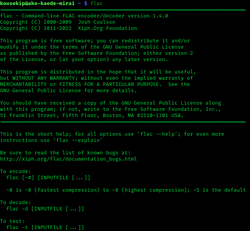 | |
 | |
| Developer(s) | Xiph.Org Foundation, Josh Coalson, Erik de Castro Lopo |
|---|---|
| Initial release | 20 July 2001 |
| Stable release | 1.4.3[1]
/ 23 June 2023 |
| Repository | |
| Written in | C, C++ |
| Operating system | Cross-platform |
| Type | Codec |
| License | Command-line tools: GNU GPL Libraries: BSD |
| Website | xiph |
| Filename extension |
.flac |
|---|---|
| Internet media type |
audio/flac |
| Uniform Type Identifier (UTI) | org.xiph.flac |
| Magic number | fLaC[2] |
| Type of format | Lossless audio |
| Standard | xiph |
| Open format? | Yes[3] |
| Free format? | Yes |
FLAC (/flæk/; Free Lossless Audio Codec) is an audio coding format for lossless compression of digital audio, developed by the Xiph.Org Foundation, and is also the name of the free software project producing the FLAC tools, the reference software package that includes a codec implementation. Digital audio compressed by FLAC's algorithm can typically be reduced to between 50 and 70 percent of its original size[4] and decompresses to an identical copy of the original audio data.
FLAC is an open format with royalty-free licensing and a reference implementation which is free software. FLAC supports metadata tagging, album cover art, and fast seeking.
- ^ "FLAC 1.4.3 Released With More Optimizations, Drops PowerPC-Specific Code". 23 June 2023. Retrieved 19 February 2024.
- ^ Coalson, Josh. "FLAC – format". Xiph.Org Foundation. Retrieved 4 April 2013.
"fLaC", the FLAC stream marker in ASCII, meaning byte 0 of the stream is 0x66, followed by 0x4C 0x61 0x43
- ^ "PlayOgg!". Free Software Foundation. 17 March 2010. Retrieved 1 October 2013.
- ^ "Looking at Flac Compression Ratios". Steven Pigeon. 7 February 2012. Retrieved 10 May 2018.